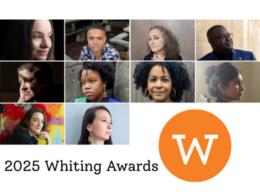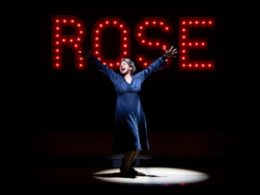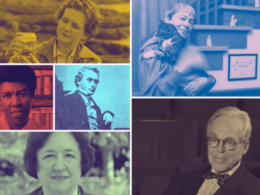Fifty years ago today John F. Kennedy Jr. was sworn in as the thirty-fifth President of the United States. His speech (video below), which at fourteen minutes is relatively short for an inaugural address, has become one of the most famous Presidential speeches in American history, including its unforgettable line, “ask not what your country can do for you—ask what you can do for your country.”
For the inaugural ceremony, Kennedy asked Poet Laureate Robert Frost to recite either a new poem or “The Gift Outright,” a poem published in 1942 that Frost later called “a history of the United States in a dozen [actually, sixteen] lines of blank verse.” Frost did compose a new poem for the inauguration, but he was unable to read from his manuscript due to both the wind and the reflection of the sun hitting the snow-covered ground. Thinking quickly, he instead recited from memory “The Gift Outright” (“The land was ours before we were the land’s. . .”). The Library of Congress has scanned and posted on their website the typescript of the poem he had intended to read, “Dedication.”
In honor of the fiftieth anniversary, the Kennedy Library recently began digitizing various documents from Kennedy’s life. From the trove, Maureen O’Connor has extracted JFK’s college application and posted it on Gawker’s website. Harvard’s application in those days was all of three pages long, and Kennedy’s “essay,” date April 23, 1935, was a mere five handwritten sentences. (O’Connor comments, “Somewhere, a guidance counselor just burst into a maniacal fit of laughter.”) The future president wrote:
The reasons that I have for wishing to go to Harvard are several. I feel that Harvard can give me a better background and a better liberal education than any other university. I have always wanted to go there, as I have felt that it is not just another college, but is a university with something definite to offer. Then too, I would like to go to the same college as my father. To be a ‘Harvard man’ is an enviable distinction, and one that I sincerely hope I shall attain.
This week also marked the passing of one of Kennedy’s closest colleagues, Sargent Shriver. The first director of the Peace Corps, Shriver was instrumental in encouraging Kennedy to telephone Coretta Scott King in 1960 when her husband was jailed in Georgia, an essential (and controversial) move during the Civil Rights era. Shriver remained close to Jackie Kennedy after JFK’s assassination, helping her to plan Kennedy’s state funeral.



